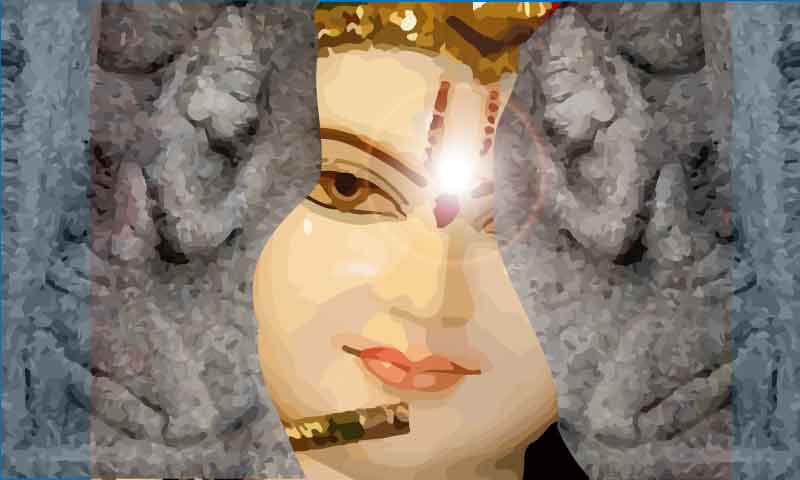
A Lesson In Humility From the Bhagavadgita

Notes: I have translated the Bhagavadgita twice. The first one was a loose translation. The second one was a word to word translation with a detailed commentary. The commentary is however different from what you will find here. In this section I will share with you my thoughts about the knowledge, philosophy and wisdom of the Bhagavadgita as I understand it from my perspective. Jayaram V
I can divide my life into three phases. In the first phase, most of the people I met in my life, including my teachers and elders, made it very clear to me that I was not an important person, my feelings and opinions did not matter, and I could be humiliated and ignored if the occasion demanded.
Then began a new phase in my life when I left for college and became free from parental authority. I realized that I could take control of my life and make decisions for myself, even if such decisions were not acceptable to others. With my new found freedom I developed individuality, and my own way of thinking.
Subsequently, a good job and early professional success made me even more opinionated, independent and judgmental. I liked the attention, the adulation and the sense of self-importance. I did not care whether my decisions hurt other people, as long as they were taken as per rules. I had people around me wherever I went, people talking about me, people whispering on my back, people seeking my help, people calling me on three different phone numbers, people appreciating my actions and decisions, and people eagerly waiting outside my office for hours to meet me for a few minutes.
Then I reached the third phase where I willingly chose to become a nobody, a non-entity, with no tags, no labels, no authority, and no special honors. For the rest of my life I decided that I would be neither special nor important, and I would avoid public attention to the extent possible.
I still feel humiliated at times if I am insulted, ignored or put down by others, but I am learning to regain my composure and move on. The name that I use to write the books and these articles is not the same name by which I am known to my friends and family. My personal Facebook account has about 20 people listed as my friends and they are mostly my own relations and some very close friends.
One of the striking features of Hindu ethics is the importance given to humility in spiritual and social practice. Humility primarily means the recognition that "I am not important," or "I am not special," or "I am not more important than others." Many grown up Hindus, especially those who are extremely successful in their lives, display striking humility in their behavior and attitude, which is often mistaken by other communities for meekness and weakness.
From the scriptures we learn that humility is practiced not only by humans but also by gods and celestial beings. When old generation Hindus approach pious people, they bow in humility. An elderly Hindu does not feel shame or humiliation in bowing or touching the feet of another person whom he considers a person of honor and virtue.
I have not seen this in any other culture outside India. Especially in the USA and UK, many second generation Hindus would not even understand why some people back in India do it in temples and public gatherings. Prostrating before gods, and prostrating before elders is the true mark of humility, and Hindus excel in it. Maybe a hundred years down the line, you may see it only in movies or in some very traditional families.
The virtue of humility is mentioned in the Bhagavadgita (16.3) as absence of self-importance (na atimanita). It is a divine quality, which arises from the predominance of sattva. It is one of the features of devotion and surrender. If you have humility, it is an indication that you have sattva.
Suggestions for Further Reading
- The Wisdom of the Bhagavadgita, Main Page
- The Wisdom of the Upanishads, Main Page
- The Bhagavad-Gita Essays and Translations
- An Introduction To The Bhagavad-Gita And Its Three Secrets
- Why to Study the Bhagavadgita Parts 1 to 4
- The Abbreviated Bhagavadgita
- The Problem of Maya Or Illusion and How To Deal With It
- The Problem of Maya Or Illusion and How To Deal With It
- The Bhagavadgita, Philosophy and Concepts
- The Many Gods and Goddesses of Hinduism
- Divine Qualities Of A True Worshipper Of God
- The Bhagavadgita on Karma, the Law of Actions
- Maya, The Grand Illusion Or The Delusion Of The Mind
- Aspects, Emanations, Incarnations and Forms of God Vishnu
- Dvaita or Advaita What is the Truth?
- Symbolism in the Bhagavadgita
- The Truth About Karma
- Meaning and Definition of Bhagavan
- Brahman the Supreme Universal Lord of All
- What is Bhakti or Devotion?
- Bhakti Marg, the Path of Devotion
- History and information about Mathura and Vrindavan Temples
- True Devotion and Qualities of a True Devotee
- Essays On Sorrow And Its Spiritual Significance
- The Yoga of Knowledge or the Samkhya Yoga, Verses and Commnetary by Jayaram V
- Essays On Dharma
- Esoteric Mystic Hinduism
- Introduction to Hinduism
- Hindu Way of Life
- Essays On Karma
- Hindu Rites and Rituals
- The Origin of The Sanskrit Language
- Symbolism in Hinduism
- Essays on The Upanishads
- Concepts of Hinduism
- Essays on Atman
- Hindu Festivals
- Spiritual Practice
- Right Living
- Yoga of Sorrow
- Happiness
- Mental Health
- Concepts of Buddhism
- General Essays